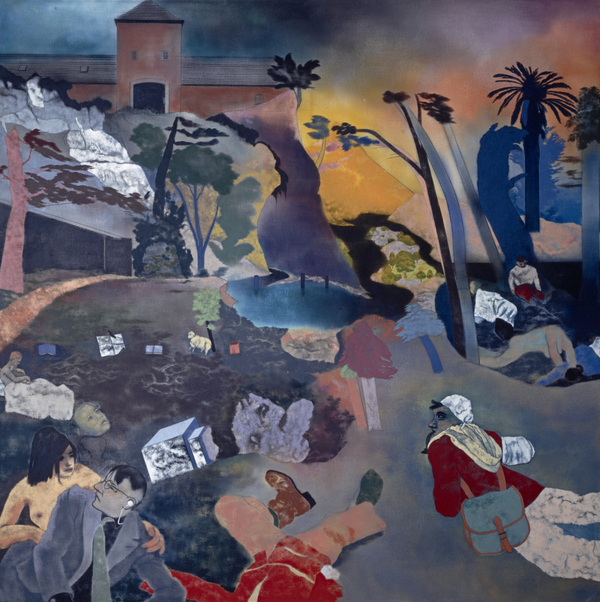 |
| If Not, Not by Ronald Brooks Kitaj 1975-6 |
A Thought for the Day given at a lunchtime service of Holy Communion (BCP) at St Giles-in-the-Fields on Wednesday 16th October 2024 based on the texts of Galatians 5.18-end and Luke 11.42-46 and inspired by the text of T.S.Eliot's 'The Waste Land' which was published on this day in 1922.
On this day in 1922, T.S.Eliot’s poem The Waste Land was first published. Regarded as one of the most important English-language poems of the twentieth century, it’s no easy read - but do look it up online. There’s a recording on YouTube of the author reading it himself.
A “heap of broken images” with multiple voices and references drawn from civilisations and cultures across human history, one commentator identifies its major motifs as “blindness, cryptic prophecy, dangerous power, stagnant relationships, plagued land and death”.
Eliot wrote the poem while recovering from a nervous breakdown at a time when the world he knew had been taken to breaking point - its people coming to terms with the trauma of what happened in the war - seeking answers to the question of how humanity could inflict such horrors upon itself. The varied characters in the poem are united by their unfulfilled, meaningless lives. Commuters sigh as they shuffle across London Bridge, their eyes set at their feet - echoes of Dante’s Inferno. We meet a typist for whom every aspect of her life is as mechanical and repetitive as the machine she is employed to use.
In our gospel reading today Jesus calls out a number of characters whose spiritual lives are similarly mechanistic. Those who expect to be put on a pedestal because they observe every tiny regulation in their worship. Those who obsess about minor and outdated rules while failing to honour the most important commandment - to love God and to love ourselves and each other as God loves us.
The people in today’s gospel reading are living empty lives. Outwardly, they project an appearance of holiness and piety. But in reality their lives are a spiritual Waste Land - just like the characters in Eliot’s poem.
In his letter to the Galatians, St Paul instructs us how to regenerate that Waste Land. To recognise the fruits of the Holy Spirit which have been seeded in each of us by the grace of God; love, joy, peace, patience, kindness, generosity, faithfulness, gentleness, and self-control. These seeds will flourish, he explains, if we live them.
T.S.Eliot’s poem concludes with the repetition of a Sanskrit word which he translates as ‘the peace that passeth all understanding’ - although it is not clear in the poem whether the characters have found it or whether this is their final, desperate plea?
But there is no such uncertainty for those who live in the Spirit and share its fruit in the world - even though at times it may feel as though we are in a Waste Land. Because by Christ’s life, death, resurrection and ascension we have been assured that we are heirs through hope of the Kingdom where the Prince of Peace reigns forever.


%20by%20Thobias%20Minzi,%20Tanzania.jpg)
No comments:
Post a Comment